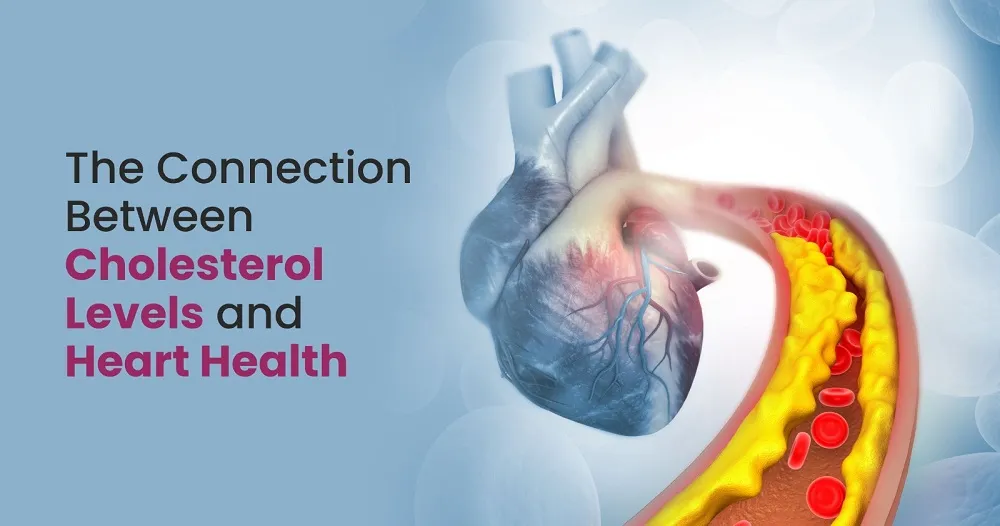The Connection Between Cholesterol Levels and Heart Health
Sep 25, 2023

Cholesterol is essential in our body for good health but in adequate amounts. An increase in blood cholesterol level may give rise to numerous other health issues, such as coronary artery disease or heart disease. As per studies, the annual number of deaths due to CVD or cardiovascular diseases has risen from 2.2 million to 4.7 million within three decades (1990 to 2020).
Although your body needs cholesterol to function, too much "bad cholesterol" can cause fatty deposits to accumulate in arteries. These fatty deposits in the arteries may increase your risk of developing ailments like coronary heart disease, heart attacks, and stroke. So, high cholesterol levels are linked to heart diseases, and this article delves into establishing a connection between them.
How Cholesterol Affects Heart Health?
Cholesterol is present in blood carried by arteries, a waxy and fatty substance. Cholesterol is good for health, but only in the proper amounts. Monounsaturated fats (found in olive oil) and polyunsaturated fats (found in fish, canola, and walnuts) are good fats essential for your body. Fats are a major energy source and essential for building the cell membrane, a vital exterior for each cell. Besides, it is essential for blood clotting, muscle movement, and inflammation.
Saturated fat, trans fat, and cholesterol come in the category of bad cholesterol. A high number of bad cholesterol or when too many lipids (fats) are present in your blood can lead to developing a condition called Hyperlipidemia and hypercholesterolemia, or simply high cholesterol.
Your body can't utilize excessive lipids, which leads to thickening of arteries. Blood's fatty deposits (plaques) are formed when they combine with other substances. This plaque may not cause any issues for years, but it silently enlarges your arteries. High cholesterol is dangerous if left untreated for this reason. It becomes difficult to recognize how much those extra lipids in the blood contribute to the plaque's growth.
Blood tests are the only way to determine if you have high cholesterol. The amount of lipids present in your blood can be determined by a blood test known as a Lipid Profile Test.
Normal Cholesterol Level In Your Body
Doctors advise a total cholesterol level under 200 mg/dL. The breakdown is as follows.
- An LDL (bad cholesterol) level of 160 mg/dl or higher is a significant risk factor for heart attack, stroke, and other issues brought on by clogged arteries.
- A higher number for HDL is preferable because it offers protection against heart disease. A level under 40 mg/dl is low and is regarded as a risk factor because it raises your risk of developing heart disease. At the same time, more than 60 mg/dl may lower the risk of heart disease.
- Some people may need treatment if their triglyceride levels are high (200 mg/dl or more) or borderline high (150 mg/dl –
 199 mg/dl).
199 mg/dl).
Causes Of High Cholesterol
Protein-bound cholesterol transported through the bloodstream combines with cholesterol to form a lipoprotein. Depending on what the lipoprotein carries, there are various kinds of cholesterol. These are:
- Low-density Lipoprotein (LDL)
LDL, or "bad" cholesterol, transports cholesterol metabolites all over your body. LDL cholesterol accumulates in artery walls to cause hardening and tightening of arteries.
- High-density Lipoprotein (HDL)
HDL, called High-density lipoprotein or "good" cholesterol, collects extra cholesterol and transports it back to your liver.
- Triglycerides
Triglycerides, a form of blood fat, are frequently measured as part of a lipid profile. If your triglyceride levels are high, you may also be at an increased risk for heart disease.
Risk Factors for High Cholesterol
The risk of having unhealthy cholesterol levels can be influenced by:
- Poor diet: Unhealthy cholesterol levels can be caused by eating too much trans or saturated fat. Saturated fats can be found in full-fat dairy products and fatty meat cuts. Trans fats are present in packaged desserts or snacks.
- Obesity: If your body mass index (BMI) is 30 or higher, it will put you at risk for high cholesterol.
- Lack of exercise: Exercise for 30 minutes or 1 hour can increase the levels of good cholesterol in the body.
- Smoking - Smoking may lead to declining HDL, the good cholesterol.
- Alcohol: Alcohol consumption in excess can raise your total cholesterol level.
- Familial Hypercholesterolemia: FH is an inherited genetic disorder that affects some people. Starting at a young age, this condition causes extremely high levels of low-density lipoprotein cholesterol, which, if left untreated, worsens with age.
- Age: Although unhealthy cholesterol can exist in young children, people over 40 are likelier to have it. Your liver's capacity to eliminate LDL cholesterol declines with advancing age.
When To Visit A Doctor?
There are usually no noticeable symptoms of high cholesterol. Without routine cholesterol testing, individuals might not know their high cholesterol level until they experience heart disease. Heart disease, on the other hand, frequently has no apparent symptoms. Here are some guidelines that you can follow to take preventive steps to avoid complications:
- People should get their cholesterol levels checked from a young age.
- A minimum of once between the ages of 9 and 11 is when children's cholesterol levels are checked.
- Between the ages of 17 and 21, adolescents should have a checkup.
- Every 4-6 years, healthy adults should have their cholesterol evaluated.
- The levels of those who have heart disease, diabetes, or a history of high cholesterol must be checked more frequently.
Wrapping up,
The risk of cardiovascular conditions like stroke and heart disease increases due to high levels of LDL in the blood. So, the key to minimizing the risk of developing a heart condition depends upon maintaining good cholesterol levels and reducing bad cholesterol levels. Switching to a healthier lifestyle, like daily 30-minute exercise, eating healthy fruits and juices, and other habits, can assist in keeping your heart healthy!
However, you can make better choices if you know your cholesterol levels. A consultation with the doctor will help you analyze what changes you need to make in your daily life routine to keep your heart fit and fine! Apollo Diagnostics is your partner in providing cholesterol level tests, where you can take the test and get the results at the convenience of your home. Visit our website and schedule a test today!
Frequently Asked Questions
1. What is Cholesterol?
The body naturally produces cholesterol, a waxy, fat-like substance produced by the liver. There are mainly three types of cholesterol:
- HDL or High-Density Lipoprotein Cholesterol
- LDL or Low-Density Lipoprotein Cholesterol
- Triglycerides
2. What causes cholesterol to be a problem?
Heart disease and other cardiovascular diseases are more likely to develop if you have too much LDL or low-density lipoprotein cholesterol because it gets collected on the walls of arteries and reduces the blood flow.
3. What level of cholesterol is too high?
According to doctors, your total cholesterol should not exceed 200 mg/dL.
Related Blog Post
- What does Lipid Profile mean?
- Does lowering cholesterol reduce the risk of heart disease and stroke in the elderly?
- Cholesterol Management
- Everything You Need To Know About Cholesterol
- Know Your Numbers: Understanding Cholesterol, Blood Pressure, and Heart Health
- Exploring the Relationship Between Cholesterol and Cardiovascular Health
Blog Categories
- Child Health
- Mens Health
- Women's Health
- Mental Health
- Health Myths & Facts
- Fitness
- Nutrition/Recipes
- Remedies
- Weight Management
- Stress Management
- Health Supplements
- Addiction Management
- Disease Management
- Allergy
- Anemia
- Arthritis
- Asthma
- Autoimmune Diseases
- Blood Pressure
- Cancer
- Deficiencies
- Dengue/Malaria/Chikungunya
- Diabetes
- Eye Problems
- Heart Diseases
- Hepatitis
- HIV/AIDS/STD
- Hormonal Imbalance
- Infection/Flu/Viral
- Kidney
- Liver
- Menstrual Problems
- Pregnancy
- Skin & Hair Problems
- Stomach Ailments
- Thyroid
- Others
- Health Checkups
- Diagnostics/Pathology
- Lifestyle & Wellness
- Covid
- Medical Tests
- Cholesterol
- Health Tips
- Parent Care/Old Age
- Lungs
- Food Intolerance








